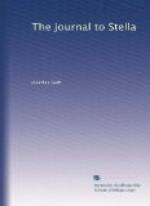Swift throws much light, too, on the daily life of his time. The bellman on his nightly rounds, calling “Paaast twelvvve o’clock”; the dinner at three, or at the latest, four; the meetings at coffee-houses; the book-sales; the visit to the London sights—the lions at the Tower, Bedlam, the tombs in Westminster Abbey, and the puppet-show; the terrible Mohocks, of whom Swift stood in so much fear; the polite “howdees” sent to friends by footmen; these and more are all described in the Journal. We read of curious habits and practices of fashionable ladies; of the snuff used by Mrs. Dingley and others; of the jokes—“bites,” puns, and the like—indulged in by polite persons. When Swift lodged at Chelsea, he reached London either by boat, or by coach,—which was sometimes full when he wanted it,—or by walking across the “Five Fields,” not without fear of robbers at night. The going to or from Ireland was a serious matter; after the long journey by road came the voyage (weather permitting) of some fifteen hours, with the risk of being seized or pursued by French privateers; and when Ireland was reached the roads were of the worst. We have glimpses of fashionable society in Dublin, of the quiet life at Laracor and Trim, and of the drinking of the waters at Wexford, where visitors had to put up with primitive arrangements: “Mrs. Dingley never saw such a place in her life.”
Swift’s own characteristics come out in the clearest manner in the Journal, which gives all his hopes and fears during three busy years. He was pleased to find on his arrival in London how great a value was set on his friendship by both political parties: “The Whigs were ravished to see me, and would lay hold on me as a twig while they are drowning;” but Godolphin’s coldness enraged him, so that he was “almost vowing vengeance.” Next day he talked treason heartily against the Whigs, their baseness and ingratitude, and went home full of schemes of revenge. “The Tories drily tell me I may make my fortune, if I please; but I do not understand them, or rather, I do understand them.” He realised that the Tories might not be more grateful than others, but he thought they were pursuing the true interests of the public, and was glad to contribute what was in his power. His vanity was gratified by Harley inviting him to the private dinners with St. John and Harcourt which were given on Saturdays, and by their calling him Jonathan; but he did not hope too much from their friendship: “I said I believed they would leave me Jonathan, as they found me. . . but I care not.”
Of Swift’s frugal habits there is abundant evidence in the Journal. When he came to town he took rooms on a first floor, “a dining-room and bed-chamber, at eight shillings a week; plaguy dear, but I spend nothing for eating, never go to a tavern, and very seldom in a coach; yet after all it will be expensive.” In November he mentions that he had a fire: “I am spending my second half-bushel of coals.”




